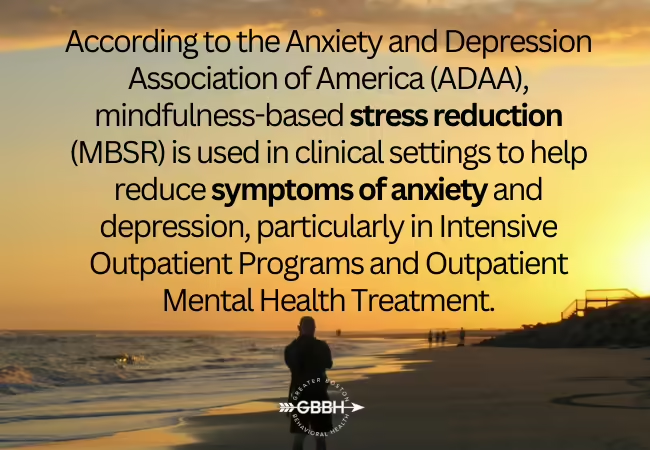In today’s fast-paced world, mental health challenges such as anxiety, depression, and stress are common. These challenges can sometimes feel overwhelming, but there is a growing body of research supporting mindfulness as a powerful tool to improve emotional well-being. Mindfulness is the practice of focusing on the present moment without judgment, and it can be a transformative part of mental health treatment, helping individuals manage difficult emotions and thoughts. At Greater Boston Behavioral Health, we encourage mindfulness practices as part of our Mental Health Treatment Programs to enhance the effectiveness of therapy and support our clients in achieving long-term recovery.
In this article, we’ll explore practical and simple ways to incorporate mindfulness into your everyday routine, and discuss the many benefits it can offer for mental health and overall well-being.
What Is Mindfulness?
Mindfulness is about being fully present in the moment, consciously aware of your thoughts, emotions, and physical sensations without trying to change them. It is a non-judgmental way of experiencing your surroundings and internal world. Rather than focusing on past regrets or future worries, mindfulness brings your attention to what is happening right now, in this very moment.
Mindfulness has been shown to reduce symptoms of various mental health conditions, including anxiety, depression, and post-traumatic stress disorder (PTSD). For those undergoing Intensive Outpatient Programs or Outpatient Mental Health Treatment, mindfulness can complement other therapeutic approaches, such as Cognitive-Behavioral Therapy and Dialectical-Behavioral Therapy, by helping clients stay grounded, calm, and present during difficult emotional experiences.
Ways to Practice Mindfulness
- Mindful Breathing: A Simple yet Powerful Tool
One of the most accessible mindfulness practices is mindful breathing. It’s a simple technique that can be done anywhere, anytime, and can help calm the mind, reduce anxiety, and lower stress levels. To practice mindful breathing:
- Find a quiet space where you won’t be disturbed.
- Close your eyes and take a deep breath in through your nose for a count of four.
- Hold the breath for a moment, and then exhale slowly through your mouth for a count of six.
- As you breathe, focus all of your attention on the sensation of the breath entering and leaving your body. If your mind starts to wander, gently bring your focus back to your breath.
This practice helps you center yourself and release built-up tension. It’s especially beneficial for those struggling with anxiety or stress, offering a calming effect that can be used as a grounding tool throughout the day.
- Mindful Eating: Focus on the Sensory Experience
Eating is an essential part of our daily lives, yet it is often done mindlessly while multitasking, watching TV, or scrolling through our phones. Mindful eating is about focusing entirely on the sensory experience of eating, which can help you enjoy your food more and become more in tune with your body’s hunger and fullness cues.
To practice mindful eating:
- Begin by focusing on the appearance, texture, and smell of your food before taking a bite.
- Chew slowly, savoring the flavors and sensations in your mouth. Pay attention to how the food feels as you chew and swallow.
- Avoid distractions like screens, and instead, focus solely on the food and the act of eating.
Mindful eating helps promote healthier eating habits and a more positive relationship with food, which can be particularly helpful for those dealing with emotional eating or unhealthy food patterns associated with stress, anxiety, or depression.
- Body Scan Meditation: Cultivating Awareness of Physical Sensations
A body scan is a mindfulness technique that involves mentally scanning your body for areas of tension or discomfort. This practice can help you connect with your physical sensations, release tension, and increase body awareness, which can be especially helpful for individuals dealing with stress, anxiety, or depression.
To perform a body scan meditation:
- Find a comfortable, quiet space to lie down or sit in a relaxed position.
- Close your eyes and take a few deep breaths to center yourself.
- Slowly move your attention through your body, starting from your toes and gradually working your way up to your head.
- As you focus on each body part, notice any areas of tension or discomfort. Without judgment, simply acknowledge those sensations and allow them to relax.
Body scan meditations can help you become more attuned to your body’s needs and signals, fostering a sense of relaxation and stress relief. Incorporating this practice before bed can also help promote restful sleep.
- Mindful Walking: Bringing Awareness to Movement
Mindful walking involves being fully present during a walk, paying attention to the sensations in your body and the environment around you. It combines gentle movement with mindfulness, helping you stay grounded and clear-headed, while also promoting physical health.
To practice mindful walking:
- Find a quiet place where you can walk without distractions, such as a park or a calm street.
- Begin walking at a comfortable pace, paying attention to the sensation of your feet making contact with the ground.
- Notice the rhythm of your steps, the movement of your body, and the sounds and sights around you. If your mind starts to wander, gently bring your attention back to the act of walking.
Mindful walking helps you reconnect with your surroundings, increase mindfulness, and reduce stress, making it an excellent practice for those managing mental health challenges like anxiety or depression.
- Mindful Listening: Enhancing Connection and Communication
Mindful listening involves giving someone your full attention during a conversation, without distractions or interruptions. This practice not only helps you become more present but also strengthens relationships and fosters emotional connection.
To practice mindful listening:
- When speaking with someone, give them your undivided attention. Put away your phone or any other distractions.
- Focus on the speaker’s words, tone, and emotions, without planning your response or judgment.
- Allow them to finish their thoughts before you respond.
Mindful listening improves communication and emotional connection, which can be helpful for strengthening relationships with loved ones and fostering a sense of support during challenging times.
- Gratitude Practice: Shifting Focus to the Positive
Gratitude is a powerful mindfulness practice that helps you shift your focus from what’s going wrong to what’s going right in your life. Practicing gratitude has been shown to improve mood, reduce anxiety, and increase feelings of happiness.
To practice gratitude:
- Take a moment each day to reflect on or write down three things you’re grateful for. They can be big or small—anything that brings you a sense of appreciation.
- Focus on the positive aspects of your life, and allow yourself to experience a sense of gratitude for the present moment.
Incorporating gratitude into your daily routine can improve overall mental well-being and help you maintain a positive outlook, even during tough times.
How Mindfulness Enhances Emotional Regulation
Mindfulness plays a crucial role in emotional regulation by helping individuals become more aware of their emotions in real time. When practiced regularly, mindfulness enables people to observe their thoughts and feelings without judgment, which reduces the intensity of emotional reactions. This heightened self-awareness helps individuals pause before reacting to stressors, allowing them to choose healthier responses. For people in Anxiety Treatment Programs or undergoing Depression Treatment Programs, mindfulness techniques can significantly improve their ability to manage difficult emotions. By regularly practicing mindfulness, individuals can better understand the triggers of their emotions, leading to greater emotional balance and improved overall well-being.
The Science Behind Mindfulness and Mental Health
Research into mindfulness and its effects on mental health has grown significantly in recent years, with numerous studies demonstrating its positive impact. Mindfulness has been shown to activate the prefrontal cortex, the part of the brain responsible for decision-making, emotional regulation, and problem-solving. It also helps reduce activity in the amygdala, which is involved in the brain’s stress response. This shift in brain activity allows individuals to respond more calmly to stress and emotional triggers, making mindfulness particularly effective in treating anxiety and depression. By enhancing neural pathways associated with emotional control, mindfulness can help reduce symptoms of mental health disorders, making it a valuable tool for those enrolled in Mental Health Treatment Programs.
Mindfulness for Stress Reduction
Stress is a natural part of life, but chronic stress can lead to negative physical and mental health outcomes. Mindfulness has been proven to help individuals reduce their stress levels by encouraging them to focus on the present moment, rather than worrying about past or future events. By practicing mindfulness, people can learn to recognize early signs of stress and use mindfulness techniques, such as deep breathing or body scans, to calm their mind and body. This practice helps interrupt the stress response cycle and brings the body into a state of relaxation. For those participating in Intensive Outpatient Programs or receiving Mental Health Therapy Programs, incorporating mindfulness for stress reduction can lead to better coping strategies, improve emotional resilience, and promote overall mental health stability.
The Benefits of Mindfulness for Family Members Supporting a Loved One
Mindfulness isn’t just beneficial for the individual undergoing treatment—it’s also a powerful tool for family members and caregivers. Supporting a loved one with mental health challenges can be emotionally taxing, and mindfulness helps family members manage their own stress and emotions. By practicing mindfulness, caregivers can cultivate a sense of patience, compassion, and presence, which enhances their ability to support their loved ones. Mindfulness can also reduce feelings of frustration or burnout, fostering healthier relationships and communication. For families of individuals in Anxiety Treatment Programs or Depression Treatment Programs, mindfulness can strengthen the support system, encouraging more effective and empathetic care. This is especially important in maintaining the mental health of both the individual and their loved ones as they navigate the recovery process together.
The Role of Mindfulness in Mental Health Treatment
Mindfulness is a powerful tool in managing mental health conditions, particularly when used alongside traditional therapies like Cognitive-Behavioral Therapy (CBT) and Dialectical-Behavioral Therapy (DBT). At Greater Boston Behavioral Health, we integrate mindfulness techniques into our Depression Treatment Programs and Anxiety Treatment Programs to help individuals manage their symptoms more effectively. By staying grounded in the present moment, individuals can gain better control over their thoughts and emotions, reducing the impact of mental health struggles on their daily lives.
Conclusion
Mindfulness can be a transformative part of your mental health journey, helping you manage stress, anxiety, depression, and other emotional challenges. By incorporating mindfulness into your everyday life, you can enhance your emotional well-being, improve focus, and build a greater sense of inner peace. If you’re looking for more structured support, Greater Boston Behavioral Health offers comprehensive Mental Health Treatment Programs that integrate mindfulness and other therapeutic approaches to support your recovery. Take the first step today and reach out to us at (888)278-0716 and invest in your mental wellness you deserve it.
FAQ on Ways to Practice Mindfulness
What is mindfulness?
Mindfulness is the practice of paying attention to the present moment without judgment. It involves observing your thoughts, feelings, and physical sensations with full awareness.
How does mindfulness help with anxiety and depression?
Mindfulness can help reduce anxiety and depression by fostering emotional regulation, improving self-awareness, and helping individuals respond to difficult emotions in a healthier way.
Can mindfulness be practiced at home?
Yes, mindfulness can easily be practiced at home through activities like mindful breathing, eating, walking, and meditation.
What is the role of mindfulness in therapy?
Mindfulness enhances therapy by helping individuals stay focused on the present moment, recognize negative thought patterns, and develop healthier ways of coping with stress and emotions.
How can mindfulness be incorporated into treatment programs?
At Greater Boston Behavioral Health, we incorporate mindfulness into Depression Treatment Programs, Anxiety Treatment Programs, and Intensive Outpatient Programs (IOP) to help clients manage their mental health more effectively.


